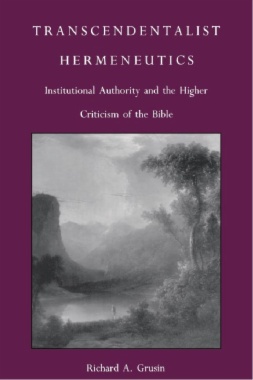American literary historians have viewed Ralph Waldo Emerson’s resignation from the Unitarian ministry in 1832 in favor of a literary career as emblematic of a main current in American literature. That current is directed toward the possession of a self that is independent and fundamentally opposed to the “accoutrements of society and civilization” and expresses a Transcendentalist antipathy toward all institutionalized forms of religious observance.
In the ongoing revision of American literary history, this traditional reading of the supposed anti-institutionalism of the Transcendentalists has been duly detailed and continually supported. Richard A. Grusin challenges both traditional and revisionist interpretations with detailed contextual studies of the hermeneutics of Ralph Waldo Emerson, Henry David Thoreau, and Theodore Parker. Informed by the past two decades of critical theory, Grusin examines the influence of the higher criticism of the Bible—which focuses on authorship, date, place of origin, circumstances of composition, and the historical credibility of biblical writings—on these writers. The author argues that the Transcendentalist appeal to the authority of the “self” is not an appeal to a source of authority independent of institutions, but to an authority fundamentally innate.
- Contents
- List of Abbreviations
- Acknowledgments
- Introduction
- Chapter One. Emerson's Resignation from the Ministry "The True Doctrine Respecting Forms”
- “My Regeneration of Mind, Manners, Inward & Outward Estate”
- “Hoc Est Corpus Meum”
- “To Make Those Who Partake of It Better”
- “How It Figures in the Ledger”
- “An Amulet against Delusions”
- “By Hatred of Excess”
- “The Sublime Attractions of the Grave”
- “The Scheme of Necessity”
- “We Worship in the Dead Forms of Our Forefathers”
- The Moral Presence of Christ
- Chapter Two. The Divinity School "Address" Controversy "There Is No Dead Letter but a Perpetual Scripture”
- “Endorser for the Heresy”
- The "Unitarian Conscience” and the "Regula Fidei”
- “The Teacher of the Coming Age”
- Chapter Three. Thoreau's Mythological Interpretation Seeing through "The Mist of Prejudice”
- “To Look through Each Other's Eyes”
- “History, Poetry, Mythology!”
- “A la Mode Strauss”
- “The Mist of Prejudice”
- “A Natural Sabbath”
- Chapter Four. The Two Theodore Parkers: Interpretation, Intuition, and Maternal Authority
- “There Are Two Theodore Parkers Now”
- “The Great Spiritual Trial of My Life”
- “What God Pronounces True”
- “The Dear Heavenly Mother”
- “The Oldest Institution of the World”
- Notes
- Works Cited
- Index

